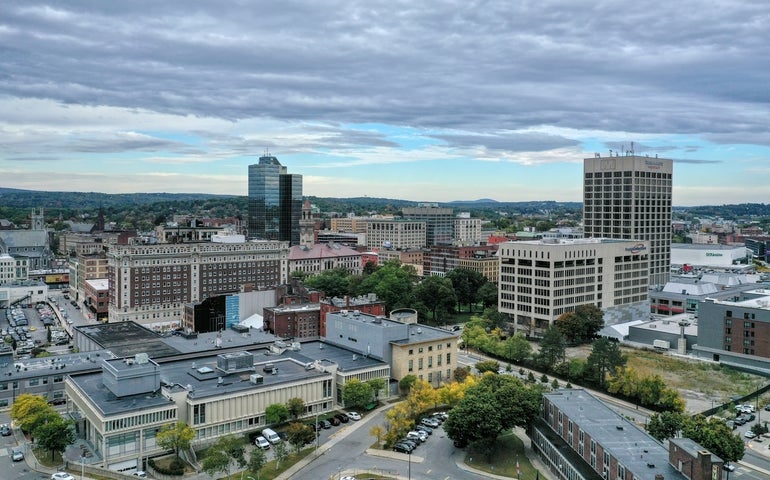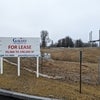Report: Regional taxes would drain jobs, investment
 Photo | TMS Aerial Solutions
Downtown Worcester
Photo | TMS Aerial Solutions
Downtown Worcester
As negotiations over legislation that would give cities or towns the power to authorize a local surtax to fund transportation projects near the two-month mark, a conservative think tank says its analysis found that provision could lead to "potentially devastating economic effects across local economies within Massachusetts."
Coalitions representing dozens of cities and towns have urged lawmakers piecing together a compromise transportation bond bill to approve the Senate-backed regional ballot initiative proposal and a House-backed "value capture" proposal, but the Beacon Hill Institute for Public Policy Research said it found the proposals would lead to negative economic impacts that would largely offset the revenue raised by the surtaxes, based on an analysis of Suffolk County.
"This analysis shows that, within Suffolk County, tax surcharges of the kind considered here would inflict substantial losses in employment, investment, and disposable income. When the negative effects on employment, investment, and disposable income in the county (which is to say, the 'dynamic' effects of the tax changes) are taken into account, the amount of revenue gained by imposing the tax surcharges would barely exceed the loss of disposable income to county residents," the institute said in a report published Monday. "The economic losses will increase exponentially if a local option sales tax or property tax levy limit increase is imposed at a regionwide level."
The Senate's version of the bond bill (S 2836) would authorize regional ballot initiatives for transportation purposes, a system in which any city or town could approve a surtax within its borders and direct the additional revenue toward transportation revenue. Before the increase could take effect, a municipality's governing body would first need to authorize a surtax on the sales, real or personal property, room occupancy or vehicle excise tax and then secure approval from a majority of voters through a ballot question.
Two or more communities could join together to approve regional surtaxes as a way of funding transportation projects that impact multiple areas. Advocates have said regional ballot initiatives allow towns or regions to have more control over transportation infrastructure solutions while opponents say they circumvent Proposition 2 1/2 and could also deepen regional inequities because lower-income communities have less of a tax base on which to build transportation funding.
The Beacon Hill Institute said it used its State Tax Analysis Modeling Program for Massachusetts methodology to determine the economic impacts of the Senate's proposed local option sales tax on Suffolk County "due to the magnitude of the local economies within the county."
"Localities with larger economies would experience the largest impacts. In Boston (the largest economy in our analysis), employment would fall by 1,097 jobs; investment would fall by $105 million, and disposable income by over $47 million in the first year," report authors David Tuerck and William Burke wrote. "In Chelsea, employment would fall by 33 jobs; investment would fall by $3 million, and disposable income by over $1 million. In Revere, employment would fall by 39 jobs; investment would fall by nearly $4 million, and disposable income by nearly $2 million. Winthrop would experience only a fraction of the economic impacts due to its smaller economy."
BHI's analysis appears to have focused solely on the impacts of raising revenue for transportation projects, but not the benefits that could come as a result when that tax revenue is spent on those projects, typically large public works efforts.
For example, mayors and town officials from dozens of communities wrote to legislative negotiators in July urging them to support the regional ballot initiative proposal because "local and regional transportation investments will play an important role to foster economic revitalization and recovery ... [and] will help create jobs and promote greater access to Main Streets for employees and consumers alike."
Massachusetts is one of nine states in the country that does not allow its local governments and citizenry to propose and pass regional ballot initiatives to raise tax money for transportation, and the idea has floated around Beacon Hill for years.
The Senate overwhelmingly supported the inclusion of a regional ballot initiative measure in a 2016 municipal modernization bill, but the House did not include a similar provision and it did not make it into the version of the bill that became law. Last session, the Senate approved an amendment putting regional ballot initiative authorization into an economic development bill, but it did not survive negotiations with the House.
Rep. William Straus, the House's Transportation Committee co-chair, told the News Service in July that he is not sure about the viability of regional ballot initiatives and suggested the Senate's proposal may not survive the conference committee negotiation process.
"My concern about regional ballot initiatives has always been that it's essentially grafting onto transportation policy a type of Proposition 2 1/2 system where whether you get good roads, safe roads, or a good transportation system depends on the variables of local municipal elections," Straus said before the bills went into conference.
Three representatives, including Straus, and three senators have been negotiating bills authorizing $17 billion to $18 billion in borrowing and numerous transportation policy changes since July 23.









0 Comments